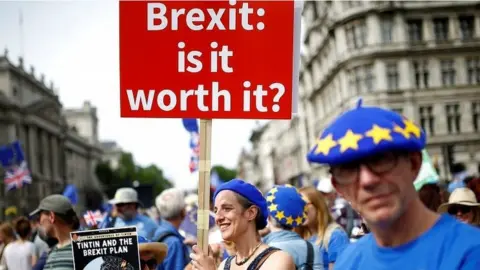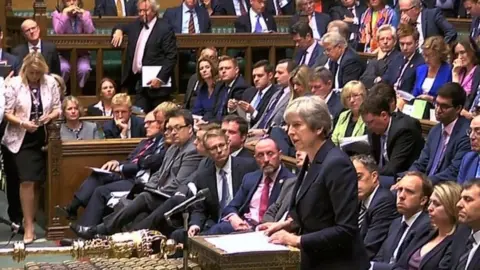People's Vote says 'multiple opportunities' for Brexit referendum
 Reuters
ReutersMPs will have "multiple" opportunities to give the public the final say over whether the UK leaves the EU, the People's Vote campaign group has said.
Theresa May has ruled out a referendum on the outcome of the Brexit negotiations under any circumstances.
But People's Vote said there were six plausible scenarios in which Parliament could legislate for another vote.
It said there should be a choice for voters between leaving with or without a deal or staying on current terms.
The prime minister says the UK made its choice to leave in 2016 and that her plan for future co-operation with the EU - based on the Chequers blueprint agreed in July - respects the referendum result.
She has said the choice facing Parliament is between leaving with or without a comprehensive agreement.
But in a report called Roadmap to a People's Vote the group campaigning for a referendum on any Brexit deal said there were no practical or legal barriers to giving the public the final say through a referendum and urged MPs not to hide behind "logistical arguments".
The British public voted to leave the EU by a margin of 51.89% to 48.11% in a referendum in June 2016.
The UK is scheduled to leave on 29 March 2019, under the terms of the two-year Article 50 process.
Negotiations on the terms of the UK's withdrawal, the so-called divorce settlement, as well as the shape of future relations between the two sides are now at a critical stage.
European leaders meeting in Salzburg on Wednesday are expected to agree to hold a special summit in November at which any deal sealed in the next six weeks could be approved.
'High bar'
Parliament will then be expected to vote on the terms of any agreement before the end of the year.
People's Vote said this Commons showdown, when it happened, could be a catalyst for securing a referendum.
The six ways it believes a referendum could be delivered are:
- Using a Commons motion when MPs vote on a Brexit deal the government has negotiated
- If MPs reject the deal or there is no deal by 21 January 2019
- If MPs approve the deal - by amending the necessary legislation to make it conditional on a referendum
- Theresa May could decide to call a referendum herself if MPs reject the deal
- She might also call one if there's no deal, in the hope of securing a mandate to take the UK out of the EU on that basis
- In the "possible chaos" of a snap general election called by Mrs May or any possible successor
Lord Kerr, the former top civil servant who wrote the report, said MPs who wanted a referendum faced a "high bar" given the government's control of the Parliamentary timetable.
But he pointed out that Mrs May, who relies on the Democratic Unionist Party for her slim Commons majority, had already suffered two Brexit defeats and if Parliament did not act "it will not be due to procedural impediments or a lack of time but because MPs have not chosen to take these opportunities".
 AFP
AFPThe cross-bench peer said the government could easily seek an extension of the Article 50 process to allow for a referendum by "withdrawing" the letter sent on 29 March 2017 notifying the EU of its intention to leave.
"The die is not irrevocably cast," he wrote.
"There is still time. If there is a majority in Parliament for a People's Vote, there are multiple routes to securing one and, as the process unfolds, more opportunities for the House of Commons to assert its will may emerge."
In terms of what question would be asked, People's Vote said it did not rule out having three options on the ballot paper - namely any deal agreed by the two sides, leaving without a deal or staying in on current terms.
But it said this was unlikely to get the backing of MPs and a "binary choice" between two options would be clearer, simpler and quicker.
While there was a case for giving 16-year olds the vote and allowing EU nationals living in the UK to take part, it said there might be "practical limits" on any changes to the franchise given the timescale involved.
The Lib Dems, the SNP and a growing number of Labour MPs back the idea of a referendum but Jeremy Corbyn has not committed to one as yet and only a handful of Tories support it.
